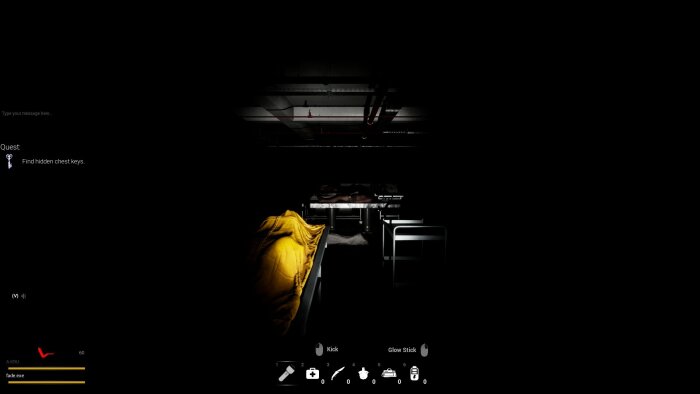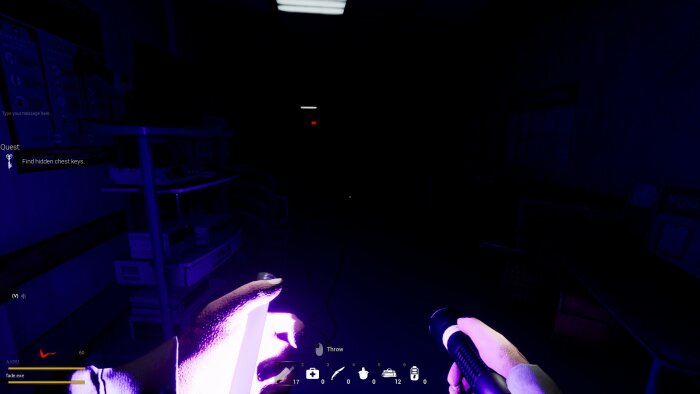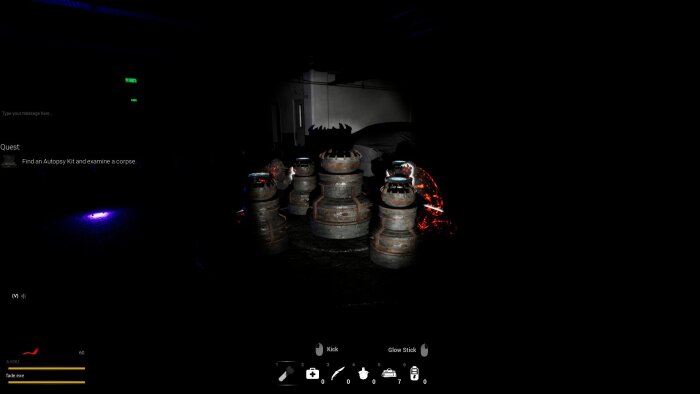Fear Therapy Game Details
Title: Fear Therapy
Genre: Indie
Developer: Black Flag Studios
Publisher: Black Flag Studios
Release Date: 24 December 2021
Store: Steam
Game Releasers: P2P
About Fear Therapy Game
Brave psychological horror in Fear Therapy, a multiplayer/single-player game where you complete quests in a dynamic, terrifying house controlled by a growing evil - or become the evil yourself!

Fear Therapy presents a chilling psychological horror experience, designed to be played either solo or with a group of friends in a cooperative multiplayer setting, supporting up to four players. The core premise revolves around a collective effort to escape a haunted house, burdened by a series of daunting quests that must be completed before it’s too late. The looming presence of Satan, growing increasingly furious with each passing second, adds a layer of unrelenting dread, ensuring that players are constantly on edge. The game is a test of mental fortitude, pushing players to their limits as they confront their deepest fears in a terrifying and unpredictable environment.
The game is explicitly labeled with a strong warning about its intense horror elements and reliance on sudden scares. The developers strongly advise against playing Fear Therapy for individuals with physical or psychological sensitivities, as the game's content is designed to be deeply unsettling and potentially triggering. This caution reflects the developers' commitment to responsible game design, acknowledging the impact that horror can have on players and prioritizing their well-being. The game's environments are oppressive and claustrophobic, amplifying anxiety and making every shadow a potential harbinger of terror. The sound design is equally crucial, with disorienting audio cues and unsettling ambient noises contributing to the creation of a constantly stressful atmosphere.
Fear Therapy is a creation of a single developer, highlighting the passion and dedication poured into the project. This fact adds a unique dimension to the game, as it reflects the singular artistic vision of its creator. It also emphasizes the developer's commitment to fostering a sense of community by actively engaging with the player base and addressing any issues or concerns. The game is not just about jump scares and gore; it weaves a psychological narrative that explores themes of anxiety, fear, and the resilience of the human spirit. Players must delve into the lore of the house, uncovering the dark secrets that lie within its walls.

The central gameplay mechanic involves locating ritual items necessary to banish the malevolent presence that has taken hold of the house. Once inside, players find themselves trapped, with the only means of escape being the completion of the ritual. This creates a sense of urgency and confinement, compelling players to work together to gather the necessary components and perform the banishing ritual. The game's most distinctive feature is its dynamic nature, ensuring a unique and unpredictable experience for every player, regardless of their skill level.
Items are randomly spawned throughout the map at the beginning of each game, forcing players to explore every nook and cranny of the house. This randomization prevents players from relying on memorized item locations, requiring them to adapt their strategies and collaborate to efficiently locate the necessary ritual components. The constant need to search for items contributes to the feeling of vulnerability, as players are never truly safe from the lurking presence of the game's antagonist. The random placement of items also ensures replayability, as each playthrough offers a fresh and challenging experience.
Navigation within the house is also dynamic, changing in real-time. This feature can disorient players, forcing them to rely on their senses and communication skills to navigate the ever-shifting environment. The constantly changing layout of the house adds another layer of challenge to the game, ensuring that players are never truly comfortable or safe. The dynamic navigation also enhances the sense of immersion, as players are constantly on edge, unsure of what lies around the next corner.

Horror events are also triggered at random intervals, making them largely unexpected and unpredictable. This randomness keeps players constantly on guard, as they never know when or where the next scare will come from. The unpredictable nature of the horror events ensures that even seasoned players will be caught off guard, maintaining a high level of tension throughout the game. The element of surprise is key to the game's effectiveness in delivering a genuinely terrifying experience.
The game's difficulty dynamically adjusts over time, eliminating the need for pre-set difficulty settings. This adaptive difficulty system ensures that players are constantly challenged, regardless of their skill level. As players progress through the game, the challenges become increasingly difficult, forcing them to refine their strategies and work even more closely together. The dynamic difficulty also helps to maintain a sense of fairness, ensuring that the game is neither too easy nor too difficult.
Fear Therapy features multiple game modes, each offering a unique gameplay experience. The single-player mode pits players against an artificial intelligence-controlled antagonist. This mode provides a challenging solo experience, testing players' skills and nerve as they attempt to survive the horrors of the house on their own. The cooperative mode allows players to team up and face the AI antagonist together. This mode emphasizes teamwork and communication, as players must rely on each other to survive.

The Satan Mode offers a unique twist, allowing one player to control the Satan and torment the other players. The player controlling the Satan has access to eight different skills that can be used to harass and hinder the other players. This mode adds a competitive element to the game, as players must outwit and outmaneuver each other. The Satan Mode also provides a unique perspective on the game's horrors, allowing one player to experience the thrill of being the antagonist.
Fear Therapy draws inspiration from a psychological theory that explores the desensitization of individuals to fear. This theory suggests that repeated exposure to fear stimuli can initially reduce fear responses, but those responses may return over time. The game attempts to simulate this process, exposing players to a variety of terrifying events and situations to see how they react. The developers explicitly state that they have tried to convey the essence of this therapy as much as possible and that players will experience elements of it during gameplay. The developers' intent is to create an experience that not only scares players but also explores the psychology of fear itself.
The developers acknowledge that the game is still in early access and that minor errors may be present. They encourage players to report any errors they encounter, emphasizing their commitment to providing an error-free experience. The game's early access status allows the developers to actively incorporate player feedback and refine the game based on the desires and suggestions of the community. The focus on player feedback demonstrates the developers' commitment to creating a game that is both terrifying and enjoyable.

Fear Therapy Key Features
- * Brace yourself for heart-pounding psychological horror in single-player or with up to 5 friends!
- * Dive into a dynamic nightmare where item locations, navigation, and scares change every second! No two playthroughs are ever the same!
- * Dare to engage in a ritual to banish Satan himself, but beware, he's growing angrier every moment!
- * Experience the chilling reality of "Fear Therapy" - will you overcome your terror or succumb to the darkness?
- * Choose your fate: cooperative play against AI, or face off in "Satan Mode" where one player embodies pure evil!
Fear Therapy Gameplay
Download Links for Fear Therapy
Download Fear.Therapy.Build.10913392
1fichier
Fear.Therapy.Build.10913392.zip
Pixeldrain
Fear.Therapy.Build.10913392.zip
Mediafire
Fear.Therapy.Build.10913392.zip
Gofile
Fear.Therapy.Build.10913392.zip
Easyupload
Fear.Therapy.Build.10913392.zip
Bowfile
Fear.Therapy.Build.10913392.zip
Fastupload
Fear.Therapy.Build.10913392.zip
Buzzheavier
Fear.Therapy.Build.10913392.zip
Frdl
Fear.Therapy.Build.10913392.zip
Mxdrop
Fear.Therapy.Build.10913392.zip
Chomikuj
Fear.Therapy.Build.10913392.zip
Vikingfile
Fear.Therapy.Build.10913392.zip
1cloudfile
Fear.Therapy.Build.10913392.zip
Usersdrive
Fear.Therapy.Build.10913392.zip
Clicknupload
Fear.Therapy.Build.10913392.zip
Rapidgator
Fear.Therapy.Build.10913392.zip
Nitroflare
Fear.Therapy.Build.10913392.zip
Turbobit
Fear.Therapy.Build.10913392.zip
System Requirements for Fear Therapy
To experience "Fear Therapy" on PC, you'll need a 64-bit Windows 10 operating system. For minimum performance, an Intel i5 (or newer generation i3) processor, or an equivalent AMD processor coupled with 8GB of RAM and a graphics card with 4GB of VRAM are required. DirectX version 12 is also essential, along with a broadband internet connection and 4 GB of available storage space. For optimal performance and a smoother experience, the game recommends an Intel i7 or an equivalent AMD processor like the AMD FX 9500+ Series, 16 GB of RAM, and a graphics card with 8GB of VRAM. You'll still need DirectX 12 and a broadband internet connection, but the recommended storage space is slightly lower at 3 GB.
Minimum:- OS: 64-bit Windows 10
- Processor: Intel i5 or new-gen i3 / AMD equivalent
- Memory: 8 GB RAM
- Graphics: 4 GB VRAM
- DirectX: Version 12
- Network: Broadband Internet connection
- Storage: 4 GB available space
- OS: 64-bit Windows 10
- Processor: Intel i7 or AMD equivalent (AMD FX 9500+ Series)
- Memory: 16 GB RAM
- Graphics: 8 GB VRAM
- DirectX: Version 12
- Network: Broadband Internet connection
- Storage: 3 GB available space
How to Download Fear Therapy PC Game
1. Extract Release
2. Launch The Game
3. Play!














![Download City Lights Love Bites Season 0 [Pilot Season]](https://reloadedxskidrow.com/images/city-lights-love-bites-season-0-pilot-season/featured-thumb.jpg)










